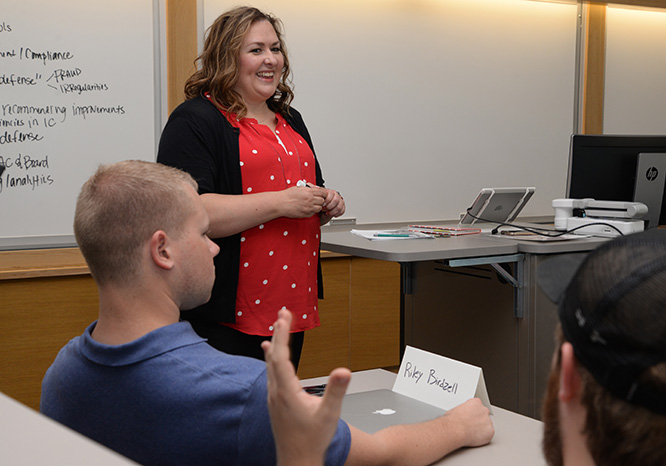After discussions with the SOA Advisory Board, Dr. Aaron Crabtree asked Saunders to develop the course combining fraud examination and internal audit, both generally standalone courses. Saunders, who worked as an internal auditor for more than seven years, viewed the opportunity as a way to teach the positive aspects of her profession.
“I graduated from school in the early 2000s when huge financial scandals were changing the landscape of the business world. It framed for me what can happen as the result of making poor decisions. As a result, I emphasize to students that the auditing profession is distinguished by its commitment to integrity, objectivity and ethical behavior,” she said.
Saunders collaborated with the external business community and invited experts to speak in class. She also provided opportunities for students to work with organizations outside the classroom.
“The course allowed me to build bridges between the two communities of internal audit and fraud examination, and receive support from the local chapter of the Association of Certified Fraud Examiners and the Institute of Internal Auditors. That made it fun and challenging,” she said.
 Saunders' infectious personality helps reinforce auditing principles to students.
Saunders' infectious personality helps reinforce auditing principles to students.
Similar to her pursuit of creating positive change in the accounting profession through the classroom, she believes her research can have practical implications for the accounting profession to better understand how practitioner behavior can result in better overall controls in the workplace. Saunders research examines whether junior accounting members are penalized for raising red flags in the workplace that may later turn out to be unfounded.
“One of the biggest hurdles for conducting research is getting access to participants. I received a grant from the Center for Audit Quality which provides access to audit practitioners to complete our study. This grant amounts to support from the eight largest global accounting firms,” she said.
Crabtree said getting the grant was a major accomplishment as the center only awards a few a year and Saunders already received two in her career.
“It’s significant to have access to professional auditors who are working to run her research experiments. It provides more validity when you’re asking an auditor versus using students to conduct the research,” Crabtree said.
He added how Saunders’ professional internal auditing experience, research credentials and technical expertise combine with her infectious personality to make her the kind of faculty member students appreciate.
Saunders’ research helps lead to classroom discussions so young auditors start thinking about how they might resolve ethical questions in the workplace.
“I find a lot of synergy between the things I research and the things I teach. Any chance I have to tie the results of my research into what the students are learning I believe helps to inform the profession and train students as they go out into their auditing careers,” said Saunders.